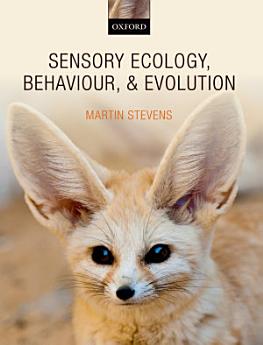Sensory Ecology, Behaviour, and Evolution
feb 2013 · OUP Oxford
4,0star
1 reviewreport
E-boek
264
Pagina's
family_home
Geschikt
info
reportBeoordelingen en reviews worden niet geverifieerd. Meer informatie
Over dit e-boek
Throughout their lives animals must complete many tasks, including finding food, avoiding predators, attracting mates, and navigating through a complex and dynamic environment. Consequently, they have evolved a staggering array of sensory organs that are fundamental to survival and reproduction and shape much of their evolution and behaviour. Sensory ecology deals with how animals acquire, process, and use information in their lives, and the sensory systems involved. It investigates the type of information that is gathered by animals, how it is used in a range of behaviours, and the evolution of such traits. It deals with both mechanistic questions (e.g. how sensory receptors capture information from the environment, and how the physical attributes of the environment affect information transmission) and functional questions (e.g. the adaptive significance of the information used by the animal to make a decision). Recent research has dealt more explicitly with how sensory systems are involved with and even drive evolutionary change, including the formation of new species. Sensory Ecology, Behaviour, and Evolution provides a broad introduction to sensory ecology across a wide range of taxonomic groups, covering all the various sensory modalities (e.g. sound, visual, chemical, magnetic, and electric) relating to diverse areas spanning anti-predator strategies, foraging, mate choice, navigation and more, with the aim being to illustrate key principles and differences. This accessible textbook is suitable for senior undergraduates, graduate students, and professional academics taking courses or conducting research in sensory ecology/biology, neuroethology, behavioural and evolutionary ecology, communication, and signalling. It will also be of relevance and use to psychologists interested in sensory information and behaviour.
Beoordelingen en reviews
4,0
1 review
Over de auteur
Martin Stevens is a BBSRC David Phillips Fellow, based in the Centre for Ecology & Conservation, University of Exeter. His research focuses on sensory ecology and behaviour, especially animal coloration and vision, across a wide range of organisms. His work has covered animal colour and spatial vision, anti-predator markings, brood parasitism and cuckoos, and sexual signals and vision in primates. He did his PhD at the University of Bristol on animal camouflage and bird vision, and has published over 40 scientific manuscripts.
Dit e-boek beoordelen
Geef ons je mening.
Informatie over lezen
Smartphones en tablets
Installeer de Google Play Boeken-app voor Android en iPad/iPhone. De app wordt automatisch gesynchroniseerd met je account en met de app kun je online of offline lezen, waar je ook bent.
Laptops en computers
Via de webbrowser van je computer kun je luisteren naar audioboeken die je hebt gekocht op Google Play.
eReaders en andere apparaten
Als je wilt lezen op e-ink-apparaten zoals e-readers van Kobo, moet je een bestand downloaden en overzetten naar je apparaat. Volg de gedetailleerde instructies in het Helpcentrum om de bestanden over te zetten op ondersteunde e-readers.






